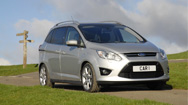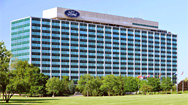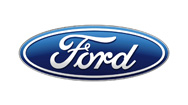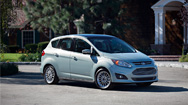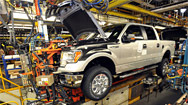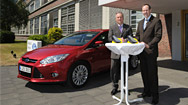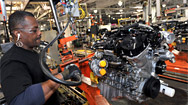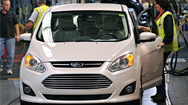Customer Satisfaction and Quality
Quality is one of the four pillars in our approach to great products: quality, safe, smart and green. Quality and customer satisfaction together are a central mission of all of our employees. They are also central to our sales and service operations, affecting customers’ willingness to consider our vehicles as well as their loyalty to our brands. High-quality vehicles also have lower warranty repair costs, which helps our bottom line.
Ford has worked tirelessly to improve quality over the past decade, and we have made great strides in overall quality. We use an extensive Global Quality Operating System at every stage of vehicle development and manufacture to make sure that our vehicles have world-class quality and performance. We begin designing for quality from the very earliest stages of every vehicle program. Years before a new model rolls off the assembly line, we are already identifying and addressing potential quality problems through virtual manufacturing technology. We undertake extensive testing of actual vehicle prototypes for both manufacturing and performance quality. We continue to evaluate and fix any quality problems that arise after our vehicles are sold. We evaluate every manufacturing-related warranty claim and develop and implement effective solutions in the assembly plants. We also gather feedback from our customers using survey tools, to ensure that we understand customers’ perspectives on our vehicles, including problems that arise and their opinions of vehicle designs and features. Thanks to our intense focus on quality, the overall quality of our vehicles has improved substantially over the past decade.
Despite these efforts, we had some significant quality issues in 2012. In the past several years, we have been dramatically increasing the innovative technologies in our vehicles, the number of new models we introduce, and the speed with which we release them. In addition we are raising production in the U.S. and other regions to match growing demand for our vehicles. All of these trends increase the pressure on both our own and our suppliers’ design, production and quality systems. Overall, we had 24 recalls in 2012. We have been working hard to rectify these problems and deliver on our promises to consumers. In November, for example, we recalled about 20,000, 2013 model year Fusions for low-beam headlamps that may develop reduced brightness. We initiated the recall quickly and voluntarily as soon as the problem arose. In less than two months from receiving the first reports of the issue, we were able to identify the root cause and provide a fix for the potential headlamp dimming. Our fast response has been well received by customers. Sales of the Fusion have remained robust despite the recall.
We know we need to do more to get our quality performance back on an improving trend. We are increasing our efforts to improve quality, even as we introduce new technologies and new vehicles at an ever increasing rate. We have worked hard to create a culture of cooperation and focus on solving the problem, not passing blame or pointing fingers, so that when quality issues arise, we can solve them quickly and effectively. We strive to ensure that we learn from every quality issue so that our overall performance continues to improve. For example, although we know that introducing new products quickly is critical, we also have to take the time to make sure everything about new vehicles is just right before they launch. Learning from the Escape and Fusion launches, we have delayed the launch of our new Lincoln MKZ to put the vehicles through an even more rigorous final quality-inspection process.
We track our progress on quality through a combination of internal and external measurements that assess how we are doing and where we can improve. The Global Quality Research System (GQRS), which tracks “things gone wrong,” is our primary quality survey1. It is implemented for us by the RDA Group, a market research and consulting firm based in Bloomfield Hills, Michigan. We also subscribe to J.D. Power and Associates’ Initial Quality Survey and APEAL study. And, we track warranty claims and costs internally. Global and regional quality improvements are detailed in this section.
- The GQRS study is conducted quarterly, with scores assessed from survey responses collected from vehicle owners by the RDA Group, a consulting firm.

